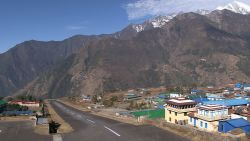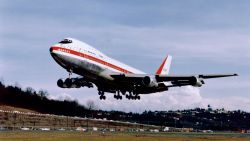It’s not the safest option but for many of China’s migrant workers a motorbike is the cheapest and easiest way to make it home for the country’s biggest holiday – the Lunar New Year.
Yang Ricai, a 36-year-old factory worker, is making the 250-kilometer journey from a factory near the city of Guangzhou to see his family in rural Guangdong province – one of an estimated 200,000 motorbike trips expected to be made in this corner of the country during the festive travel rush.
“It’s very dangerous, especially during the holidays,” he says. “Everyone is riding home, with so many more trucks and cars on the road. It’s easy to get into an accident – big trouble if it happens.”
Each year between January and February, hundreds of millions of Chinese make the journey home for Spring Festival – it’s the one time of the year when families scattered across the country reunite. This year it begins on Friday.
Most travel by plane, train or car. The Chinese rail authority says it will carry some 390 million passengers between February 1 and March 12 this year.
Wang Haisheng, a 27-year-old who has worked at the same furniture factory near Guangzhou for almost a decade, said he wished he could use a more comfortable form of transport.
“If I have more money, I would definitely take a high-speed train,” he said. “These rides are brutal. After a while, I’m exhausted and my whole body is tired.”
Wang traveled with his brother – they took turns driving during the five- to six-hour ride home.
CNN on the road
We rented our own bikes and rode the road alongside some of China’s “motorcycle army” as they made the two-wheeled journey home, including Yang Ricai.
Even though we rode with him for only a few hours, it’s clear this is an uncomfortable trip.
Constant horns, impatient drivers in cars cutting off smaller bikes, lots of traffic and a creeping damp chill in the air made us want to get off the bike as soon as possible. The only respite? Rest stops, run by volunteers along the way.
They offer everything from a hot meal of congee and hot tea to medical clinics and bike repair stations. It’s just enough to keep a rider on the road.
Of the several dozen riders we spoke to, each was a migrant worker, living away from his or her traditional home village in order to make a better wage in the big city.
Riders sometimes travel for a day to make it back to their hometowns, their bikes loaded down with as much as they can carry. Most of these journeys end in small villages in far-flung counties in either Guangdong or neighboring Guangxi province.
Yang told CNN that working so far from home was worth it, because he wants a brighter future for his children.
“I don’t want my kids to be like us,” he said. “Their lives shouldn’t be as hard as ours.”
There are signs that fewer workers are making the trek home by motorbike as China’s high-speed rail network has expanded and made rail tickets easier to get during peak travel times.
Xinhua, China’s official news agency, said that the the 200,000 motorcycle trips made through the transport hub of Zhaoqing on the route between Guangdong and the inland province of Guizhou was a sixth of the trips made in 2013.
Family reunion
In Fengkai County in rural Guangdong, near the border with Guangxi, Mai Haijun was waiting for the rest of his family to get home. He has 12 siblings all working and living elsewhere in China. All of them were making their way home to see their mother.
“We Chinese have a tradition of family reunions in our hometowns,” said Mai.
“It doesn’t matter who you are, we all return home. You don’t have a choice.”



















